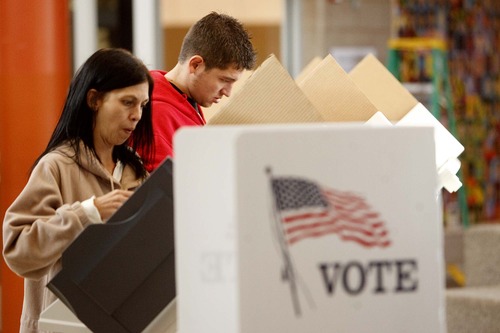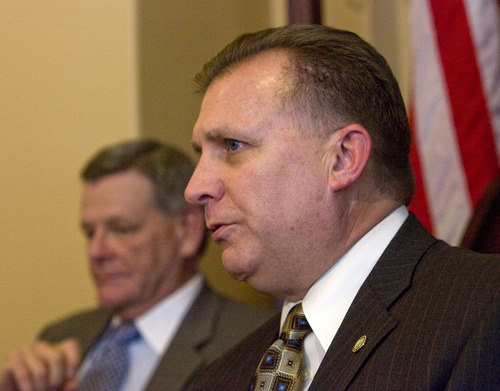This is an archived article that was published on sltrib.com in 2014, and information in the article may be outdated. It is provided only for personal research purposes and may not be reprinted.
A bill that would reform Utah's system for nominating candidates — and in the process make moot the Count My Vote reform initiative — won unanimous approval from a Senate committee Friday.
Sen. Curt Bramble, R-Provo, the sponsor of SB54, said he is trying to broker an acceptable solution between defenders of Utah's caucus system and backers of the Count My Vote initiative, which would supplant the current nominating process with direct primaries.
"We have competing views that were unable to find common ground," Bramble said. "[And] we have an initiative that has significant errors, so I felt it was appropriate for the Legislature to weigh in."
But initiative organizers assailed the effort as a hijacking of voters' rights to legislate through the ballot box.
"Legislating in this manner … basically takes away a very important right of the voters, and that is the right to petition the government and to initiate actions that way," Count My Vote co-chairman Rich McKeown said in an interview this week. "I think to the extent that this contradicts the ability of people to engage in the initiative process, it doesn't seem right."
Sen. Scott Jenkins, R-Plain City, is also proposing an amendment to the Utah Constitution that would state that parties can choose candidates however they want, without any interference from the state.
—
Requirements • Bramble's bill would force parties to comply with four conditions:
• The parties would have to provide a way for people who couldn't attend their neighborhood caucuses to vote by absentee ballot.
• The parties would need to have a system in which delegates to political conventions, who are chosen at the caucuses, can cast absentee ballots or have backup delegates in case they can't attend the convention.
• The top two vote-getters at conventions would have to square off in a primary if they don't get 65 percent of the vote, up from the current level of 60 percent.
• Party primaries would have to be open to unaffiliated voters.
If the parties comply with the requirements, the caucus system would continue. If they do not, the language put forward by the Count My Vote initiative would take effect and the party nominees would be selected by direct primaries.
Some caucus defenders objected at the state setting any guidelines on how parties pick their candidates, arguing there is a First Amendment right to associate without government intervention.
David Duncan, a member of the Republican State Central Committee, argued that Bramble's bill would greatly undermine the caucus system, and he would rather take his chances fighting the Count My Vote initiative.
But Sen. Todd Weiler, R-Woods Cross, noted that it's the state and taxpayers who pay for party primaries, so the state has the authority to set standards for parties to qualify for the ballot.
"I'm disappointed," he said, "that the political parties in this state, all of them, were unable to address the needs and concerns of a lot of citizens about the caucus process."
Weiler said Count My Vote would be "disastrous for the state," but noted initiative organizers have gathered tens of thousands of signatures. "That tells me there are people in the state who believe the status quo is problematic."
Count My Vote organizers have argued the current caucus-convention system excludes people who are unable to attend their one-night-only caucus meetings, leads to the election of delegates and candidates who are outside the mainstream, discriminates against women, discourages average Utahns from participating in the system and drives down voter participation.
Nobody from Count My Vote testified on Bramble's bill, but organizers don't like the approach.
—
Disrespecting citizens • "Legislation that intentionally nullifies legal and proper citizen action is not respectful of the constitutional process — or the people," Count My Vote said in a statement. "We have seen past instances, like the HB477 GRAMA bill, when the Legislature has passed bills directly contravening the will of the people."
In 2011, lawmakers rushed through a major rewrite of the state's open-records law and then later repealed HB477 in the face of a massive public backlash.
Bramble said, unlike HB477, there is plenty of time to debate his bill before it's finalized, but Count My Vote hasn't been willing to negotiate.
The guidelines that Bramble's bill sets for parties to qualify were part of a series of demands that Count My Vote organizers made to parties last year. If met, organizers said they would not go forward with the initiative, but the parties refused.
McKeown said that, since that time, the landscape has changed.
"That was then," McKeown said. "That was a long time ago and, because of the inability or the unwillingness to act, we felt the only alternative was to file a petition."
Now, he said, the group is seeing strong support across the state for the direct primaries that Count My Vote proposes.
A poll conducted in recent weeks by Dan Jones & Associates found that 69 percent of Utahns favor a direct primary over the current caucus system. Twenty-three percent oppose changing the system.
Count My Vote has to gather more than 100,000 signatures to put their measure on the November ballot. If voters approve it, the state would have its first direct primaries in 2016.
Bramble's bill would basically make it moot by giving parties the escape route.
Former state Sen. Dan Liljenquist said the current caucus system gives average Utahns a way to get involved in the process and is the reason Utah is being well-managed while states with direct primaries "make awful, bad policies."
"This is a system worth preserving," Liljenquist said, "and I think what Senator Bramble has done here extends what the caucus system is meant to do."
The bill was unanimously approved Friday by the Senate Business and Labor Committee and goes to the full Senate.
gehrke@sltrib.com Twitter: @RobertGehrke





